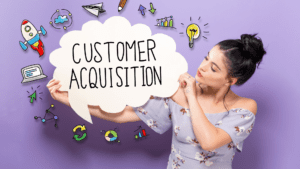
Mastering Customer Acquisition: Your Ultimate Guide to Growing Your Business
Struggling with customer acquisition? Discover proven strategies to attract, retain, and convert prospects into loyal customers.
Have you ever wondered what truly lies at the heart of customer loyalty in today’s fast-paced market?
In a marketplace cluttered with choices and where customer attention is a fleeting commodity, brand loyalty emerges as the beacon that guides businesses towards sustainable growth and success. But, why is brand loyalty important, and how can it be the difference between a thriving business and a struggling one? Let’s dive deep into the concept of brand loyalty, armed with data-driven insights, practical strategies, and an engaging narrative designed to empower your business strategy.
Get closer than ever to your customers. So close that you tell them what they need well before they realize it themselves.
Steve Jobs
Brand loyalty is the tendency of consumers to continuously choose your brand over competitors, based on positive experiences and perceived value. It’s a measure of a brand’s ability to retain customers and turn them into repeat buyers and advocates.
In today’s rapidly evolving marketplace, brand loyalty stands as a pivotal pillar of long-term business success and sustainability. It goes beyond mere repeat purchases; it’s about forging strong, emotional connections with consumers that transcend the transactional nature of buying and selling. This foundation of trust and reliability not only ensures a steady stream of revenue but also transforms satisfied customers into brand ambassadors who advocate on your behalf.
Acquiring a new customer can be 5 to 25 times more expensive than retaining an existing one. This stark contrast underscores the efficiency of focusing on loyalty; investing in existing relationships not only saves money but also optimizes marketing and operational budgets. By nurturing these existing relationships, businesses can reduce the hefty expenses associated with finding and attracting new customers, channeling these savings into enhancing product quality and customer service.
A 5% increase in customer retention correlates with at least a 25% increase in profit. This significant impact on the bottom line illustrates how small improvements in retention can lead to exponential growth in revenue. Loyal customers tend to buy more over time and are more open to trying new offerings, driving sales and profitability upwards with less effort and lower marketing costs.
Loyal customers often become brand evangelists, recommending your products or services to others. This form of free marketing, driven by genuine customer satisfaction and trust, can be more effective and credible than traditional advertising. Word-of-mouth endorsements from satisfied customers not only amplify your brand’s reach but also enhance its reputation, making it easier to attract new customers who trust the recommendations of their peers.
Brands with high customer loyalty can weather market volatility more effectively than those without. In turbulent times, a loyal customer base acts as a buffer, sustaining revenue streams even when new customer acquisition slows. This resilience gives loyal brands a strategic advantage, enabling them to focus on long-term growth and innovation rather than just survival. Moreover, in a competitive landscape, customer loyalty becomes a unique selling proposition (USP), distinguishing your brand as one that customers trust and return to, time and again.
People don’t just buy products or services; they buy stories, communities, and identities. When customers feel an emotional connection to your brand, their loyalty deepens beyond any momentary satisfaction. Here is how you can build brand loyalty:
Your products or services should not just meet customer expectations but exceed them. This commitment to excellence ensures that every interaction leaves a positive impression, reinforcing trust and satisfaction. Consistency in quality becomes the hallmark of your brand, creating a reliable experience that customers can depend on, time after time. By continually surpassing expectations, you not only secure a loyal customer base but also elevate your brand’s reputation in the marketplace.
Use storytelling and personalized experiences to build a deeper connection with your customers. Sharing your brand’s values, journey, and the people behind the scenes makes your business relatable and memorable. Personalized experiences, tailored to individual customer preferences and history, further deepen this bond, making customers feel valued and understood. Such emotional connections are the foundation of loyalty, as customers are more likely to stay with brands that resonate with them on a personal level.
Regularly engage with customers through social media, email, and other channels to keep your brand top of mind. Proactive engagement shows customers that you value their input and are eager to maintain a dialogue, not just during transactions but throughout their entire experience with your brand. This continuous interaction fosters a sense of community and belonging, making customers more inclined to stay loyal and engaged with your brand over time.
Implement loyalty programs that reward customers for their repeat business and referrals. These programs not only incentivize continued patronage but also make customers feel appreciated for their loyalty. By offering rewards, exclusive deals, and early access to new products, you encourage not just repeat purchases but also turn your customers into advocates for your brand, further expanding your reach through their networks.
Show customers that their opinions matter by actively seeking out their feedback and making visible changes based on their suggestions. This approach demonstrates a commitment to continuous improvement and customer satisfaction. Acting on feedback, especially when customers can see the tangible outcomes of their suggestions, fosters a sense of ownership and investment in the brand, further cementing their loyalty and trust.
Here’s a breakdown of effective methods to gauge the strength of your brand’s loyalty:
NPS measures the likelihood of customers recommending your brand to friends or family, providing a clear indicator of loyalty and satisfaction.
By asking customers to rate their likelihood of recommending your brand on a scale from 0 to 10, you can classify them into Promoters, Passives, and Detractors and calculate your NPS by subtracting the percentage of Detractors from the percentage of Promoters.
This metric shows the percentage of customers who continue to buy from your brand over a specific period.
Track the number of repeat customers within a given timeframe to assess how well your brand retains its customer base.
Repeat Purchase Rate: The percentage of customers who have made more than one purchase.
Purchase Frequency: How often customers purchase over a set period.
Social Media Engagement: Likes, shares, and comments indicating customers’ active interaction with your brand online.
Customer feedback and reviews are invaluable assets for any business seeking to understand and measure brand loyalty.
This direct form of communication provides qualitative insights into how customers perceive your brand, products, or services.
By actively soliciting and analyzing feedback through surveys, online reviews, and social media platforms, businesses can identify not just how loyal their customer base is, but also uncover specific aspects of the customer experience that drive satisfaction and loyalty.
This feedback serves as a critical tool for recognizing areas where a brand excels and pinpointing opportunities for improvement. Importantly, addressing customer feedback and making visible changes based on their suggestions demonstrates a brand’s commitment to its customers, further cementing their loyalty and trust.
In wrapping up our deep dive into the significance of brand loyalty and the strategic approaches to measuring it, it’s clear that the pulse of a brand’s health lies in understanding and nurturing the relationship with its customers.
From leveraging the straightforward yet revealing Net Promoter Score to dissecting engagement metrics and valuing the rich insights from customer feedback and reviews, each method offers a unique lens through which to view brand loyalty.
These aren’t just metrics; they’re the reflections of real people choosing your brand time and again. As we’ve explored, the path to sustained business growth is paved with the loyalty of satisfied customers. Therefore, investing in strategies that enhance customer satisfaction and loyalty isn’t just good practice—it’s essential to the vibrancy and longevity of your brand.
Remember, brand loyalty isn’t a destination; it’s a continuous journey of listening, adapting, and growing alongside your customers.
Net Promoter, Net Promoter System, Net Promoter Score, NPS and the NPS-related emoticons are registered trademarks of Bain & Company, Inc., Fred Reichheld and Satmetrix Systems, Inc.
Free Top 4 Customer Satisfaction Survey Templates

Struggling with customer acquisition? Discover proven strategies to attract, retain, and convert prospects into loyal customers.

In today’s business landscape, customer success has become a critical aspect of any company’s operations. The term “customer success” refers to the process of ensuring that your

In the era of data-driven decision-making, businesses are increasingly recognizing the pivotal role of customer data consolidation in shaping a seamless and personalized customer experience.
Don’t Let Your Competitors Understand Your Customers Better Than You
Don’t miss out. Try our 30-day Free Professional Trial.
